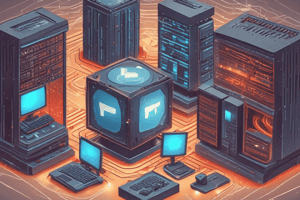Podcast
Questions and Answers
What is the main function of a proxy service firewall?
What is the main function of a proxy service firewall?
- Monitoring the entire connection process
- Inspecting messages individually to identify and block malicious ones (correct)
- Restricting access to specific ports
- Filtering incoming and outgoing network traffic
How do firewalls help in network protection?
How do firewalls help in network protection?
- By regularly auditing logs and system configurations
- By allowing communication with known malicious sources
- Filtering incoming and outgoing network traffic (correct)
- Implementing strict access control policies
What is one of the challenges associated with firewalls?
What is one of the challenges associated with firewalls?
- Implementing strict access control policies
- Regular updates and patches
- Performance overhead (correct)
- Creating lists of blocked IP addresses
Why is protocol control important in firewall management?
Why is protocol control important in firewall management?
One of the benefits of having a properly managed firewall is:
One of the benefits of having a properly managed firewall is:
Study Notes
Computer Networking Security: Firewalls
Introduction
Computer networking security is critical for protecting sensitive data and defending against cyberattacks. One crucial aspect of network security is the use of firewalls. A firewall is a network security device that helps ensure secure communication between two networks. Let's delve deeper into the world of firewalls and explore their importance in network security.
Understanding Firewalls
A firewall is a program or piece of hardware that enforces an organization's security policy by controlling access to its network resources. Basically, it acts like a sentry, monitoring and filtering network traffic based on predefined security rules. It both blocks unauthorized access to a network and prevents malicious traffic from spreading throughout the network.
Firewalls are designed to reduce the risk of cyberattacks. They operate by analyzing the flow of data packets entering and leaving the network. Based on rules or traffic patterns determined by the firewall administrator, they can either allow or deny network access to certain traffic. This process enables firewalls to protect networks from unauthorized access and cyber threats.
There are several types of firewalls available, including:
- Packet filtering: This type of firewall controls traffic based on packet headers, such as source IP address, destination IP address, and protocol used.
- Proxy service: Proxy service firewalls act at the application layer, inspecting messages individually to identify and block malicious ones.
- Stateful inspection: Stateful inspection firewalls monitor the entire connection process and keep track of the flow of packets within a session.
Benefits of Firewalls
Firewalls offer several advantages when it comes to network security:
- Network protection: Firewalls filter incoming and outgoing network traffic, preventing unauthorized access and cyber threats from reaching your network.
- IP blocking: They allow administrators to create lists of blocked IP addresses, effectively preventing communication with known malicious sources.
- Protocol control: Firewalls can restrict certain protocols deemed unsafe, reducing the attack surface and protecting against vulnerabilities associated with those protocols.
- Port control: Administrators can set rules to limit access to specific ports, further narrowing down the exposure to external threats.
To ensure optimal security, it's highly recommended to employ the best practices mentioned below:
- Regular updates and patches: Ensure that firewalls receive regular updates to fix any security vulnerabilities.
- Strict configuration: Implement strict access control policies, granting privileges only to trusted users.
- Security audits: Regularly audit logs and system configurations to detect any anomalies indicating a compromise.
Challenges of Firewalls
While firewalls provide robust network security, there are also limitations to consider:
- Complexity: Firewalls can become quite complex and challenging to configure, requiring specialized knowledge and resources.
- Performance overhead: Depending on the traffic load and complexity of the security policies, firewalls can impose a noticeable performance overhead on networks.
- False positives: Due to the massive amount of network traffic analyzed by firewalls, occasional false positives can occur, potentially disrupting legitimate connections.
Despite these challenges, the benefits of having a properly configured and managed firewall far outweigh the drawbacks. With careful planning and expertise, organizations can harness the full potential of firewalls to protect their networks and sensitive data from cyber threats.
Studying That Suits You
Use AI to generate personalized quizzes and flashcards to suit your learning preferences.
Description
Test your knowledge on firewalls, an essential component of network security. Explore the types, benefits, and challenges of firewalls in protecting networks from cyber threats.




